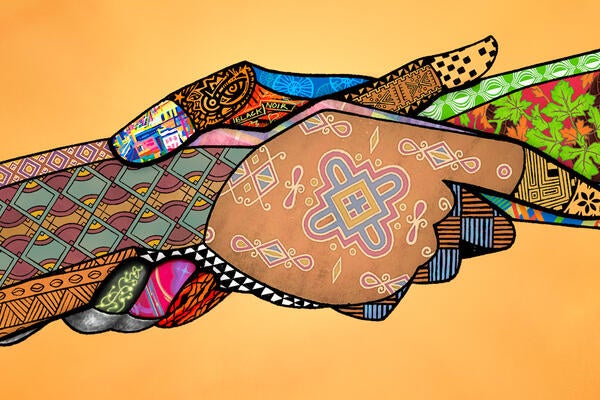
National Day for Truth and Reconciliation 2024
A message from President Goel

A message from President Goel
By Vivek Goel President and Vice ChancellorOn a bright and sunny day two years ago, in front of a large gathering on the BMH Green, we joined members of the Indigenous community to recognize and celebrate Waterloo’s commitment to decolonization, indigenization and reconciliation. It was a momentous day, and just the first of many on a long journey ahead as we continue to work towards that commitment.
This year, as we renew this commitment, we must not lose sight of the importance of National Day for Truth and Reconciliation in acknowledging the painful history of colonialism in Canada. As the original inhabitants of the lands we now call home, Indigenous Peoples have suffered devastating loss and cultural disconnect as a result of the residential school system. It is important to honour the children who never made it home and the Survivors of residential schools, as well as their families and communities.
As an institution of learning, universities play a unique role in teaching this history and in working towards truth and reconciliation. We must ensure that First Nations, Inuit and Métis knowledge and ways of knowing are represented in our scholarship, research and teachings. Our commitment also includes ensuring representation on our physical campuses and within our community.
Today, on the site where we made our initial commitment stands a permanent Indigenous gathering space. It is a physical reminder of indigeneity on campus and another step towards meeting our commitment. We also broke ground this summer on a new 500-bed residence building that will prioritize Indigenous engagement and principles into its design.
In addition to these physical structures, creating space on our campuses for indigeneity also means forging partnerships with the Indigenous community and removing barriers to our campuses for Indigenous community members.
Over the past five years, the number of self-identified Indigenous students enrolled at Waterloo has increased by over 50%. Following our 2023 announcement of a tuition waiver for students who are members of the Six Nations of the Grand River and the Mississaugas of the Credit First Nation, 26 Six Nations members and 3 Credit First Nations members have received waivers.
The number of employees at Waterloo who self-identify as Indigenous doubled between 2021 and 2023. These individuals represent eight First Nations and four Métis groups from across Canada as well as Inuit peoples.
Across our campuses, I see departments and units collaborating with the Office of Indigenous Relations (OIR) and Indigenous communities to forge strong partnerships. Earlier this month, I attended the launch of a new Indigenous collection featuring the work of Anishinaabe Onyota’a:ka artist Tehatsistahawi (Tsista) Kennedy. Proceeds from this OIR and Print and Retail Solutions initiative will support the Indigenous Student Development Fund. The previous line of Indigenous products generated over $42,000 towards the Fund.
From sharing culturally responsive approaches to health and wellness, to developing equity and inclusive communities principles in the Faculty of Mathematics, to collaborating on a speakers series, our campuses are building and fostering opportunities to meet our commitment towards indigenization, decolonization and reconciliation.
You can learn so much by listening and collaborating. I am grateful for the support and partnership of Jean Becker, Myeengun Henry and Bill Woodworth among others in helping our institution navigate this journey. I am also inspired by the work of many staff and faculty including Savannah Sloat of the Faculty of Science. Savannah and her team are leading meaningful change across their Faculty through the creation of an Indigenous Science Centre to the development of Indigenous curriculum modules (in collaboration with the Departments of English and Communication).
There is much to be proud of in the steps we’ve taken thus far as an institution, but we must continue to work towards meeting our commitment. Every member of our community plays an important role in contributing to this work, as reconciliation is a responsibility we all share.
When we originally made our commitment to reconciliation, indigenization and decolonization, no one knew exactly what was to come next, but we all understood it was an important first step on a journey that must lead to the kinds of material changes that true decolonization demands.
Thank you for your collaboration and support thus far. I look forward to continuing this journey with you.

Read more
A message from the President and Vice-Chancellor

Read more
As we prepare to celebrate Fall 2025 convocation this week, I would like to extend my heartfelt congratulations to our class of 2025.

Read more
President Goel has informed the board he will not seek a second term as president to focus on his family
The University of Waterloo acknowledges that much of our work takes place on the traditional territory of the Neutral, Anishinaabeg, and Haudenosaunee peoples. Our main campus is situated on the Haldimand Tract, the land granted to the Six Nations that includes six miles on each side of the Grand River. Our active work toward reconciliation takes place across our campuses through research, learning, teaching, and community building, and is co-ordinated within the Office of Indigenous Relations.